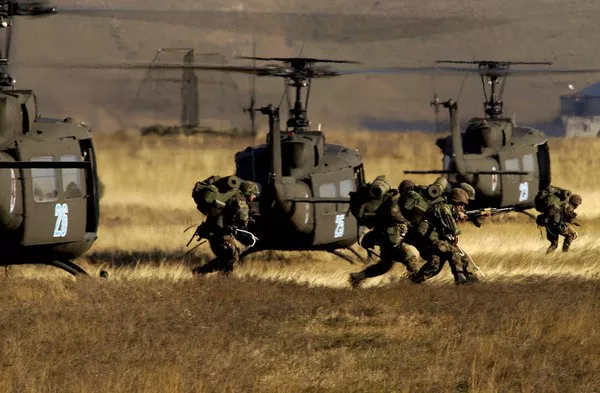In an increasingly interconnected and complex world, the balance of military power plays a crucial role in shaping geopolitics and international relations. From traditional land, sea, and air forces to emerging domains such as cyber and space, nations invest significant resources in building and maintaining formidable military capabilities. In this article, we delve into the top ten military powers in the world, analyzing their strengths, capabilities, and strategic influence on the global stage.
Top 10 Military Powers
1. United States
As the world’s foremost military superpower, the United States boasts unparalleled military capabilities across all domains. With the largest defense budget in the world, advanced technology, and a global network of military bases, the U.S. Armed Forces maintain unmatched firepower, logistical reach, and operational flexibility. From aircraft carriers and stealth bombers to cutting-edge missile defense systems and cyber warfare capabilities, the United States remains the preeminent force in global military affairs.
2. Russia
Despite economic challenges and geopolitical tensions, Russia remains a formidable military power with significant influence on the world stage. With a robust nuclear arsenal, modernized conventional forces, and a strategic focus on hybrid warfare and asymmetric tactics, the Russian Armed Forces project strength and assertiveness in regional conflicts and great power competitions. From the Arctic to the Middle East, Russia’s military capabilities shape the dynamics of international relations and strategic calculations.
3. China
As the world’s most populous nation and second-largest economy, China has rapidly expanded its military capabilities in recent decades, emerging as a major player in global security affairs. With a focus on modernization, innovation, and power projection, the People’s Liberation Army (PLA) has invested heavily in advanced weapons systems, cyber warfare capabilities, and maritime expansion in the South China Sea. China’s rise as a military power poses complex challenges and opportunities for regional stability and international order.
4. India
As one of the world’s largest democracies and fastest-growing economies, India possesses formidable military capabilities and strategic influence in South Asia and beyond. With a diverse arsenal of nuclear weapons, conventional forces, and a growing emphasis on naval power projection, the Indian Armed Forces play a crucial role in regional security dynamics, including territorial disputes with Pakistan and China. India’s military modernization efforts and strategic partnerships enhance its role as a key player in the Indo-Pacific region.
5. United Kingdom
Despite its smaller size compared to other global powers, the United Kingdom maintains significant military capabilities and strategic influence as a member of NATO and a permanent member of the UN Security Council. With a tradition of maritime power projection, a nuclear deterrent, and expeditionary forces capable of rapid deployment, the British Armed Forces contribute to international peacekeeping operations, counterterrorism efforts, and defense cooperation with allies around the world.
6. France
As a nuclear-armed nation and a leading European military power, France plays a crucial role in shaping security dynamics on the continent and beyond. With advanced military technology, expeditionary capabilities, and a tradition of military interventionism in Africa and the Middle East, the French Armed Forces project strength and influence in regional conflicts and counterterrorism operations. France’s strategic partnerships and defense cooperation with European allies strengthen its position as a key player in European security affairs.
7. Japan
As Asia’s most technologically advanced democracy and a close ally of the United States, Japan possesses formidable military capabilities and strategic influence in the Asia-Pacific region. Despite constitutional limitations on offensive military operations, the Japan Self-Defense Forces (JSDF) maintain advanced weapons systems, maritime capabilities, and ballistic missile defenses to counter regional security threats, including tensions with North Korea and maritime disputes in the East China Sea.
8. Germany
As Europe’s largest economy and a key member of NATO, Germany plays a central role in shaping European security and defense cooperation. With modernized armed forces, advanced technology, and a commitment to multinational defense initiatives, the German Armed Forces contribute to regional stability, crisis management, and deterrence against potential threats from Russia and other adversaries. Germany’s leadership in European defense integration strengthens NATO’s collective defense capabilities and enhances transatlantic security cooperation.
9. South Korea
As a vibrant democracy and a key U.S. ally in East Asia, South Korea possesses formidable military capabilities and strategic influence in the region. With a focus on deterrence against North Korean aggression, the Republic of Korea Armed Forces (ROKAF) maintain advanced weapons systems, missile defenses, and a highly trained military personnel capable of rapid response to security threats on the Korean Peninsula. South Korea’s alliance with the United States and defense cooperation with regional partners enhance its role as a stabilizing force in Northeast Asia.
10. Israel
Despite its small size and surrounded by hostile neighbors, Israel possesses one of the most technologically advanced and well-trained military forces in the world. With a focus on innovation, intelligence capabilities, and a robust defense industry, the Israel Defense Forces (IDF) maintain air superiority, missile defenses, and special operations capabilities to counter security threats from Iran, Hezbollah, and other adversaries. Israel’s military deterrence and strategic partnerships with the United States and regional allies contribute to stability and security in the Middle East.
See Also: 10 Most Backward Countries in the World
In conclusion, the top ten military powers in the world possess formidable capabilities and strategic influence that shape the dynamics of international security and geopolitics. From traditional military forces to emerging domains such as cyber and space, these nations invest significant resources in defense modernization, innovation, and strategic partnerships to safeguard their national interests and project power on the global stage. As the world undergoes profound geopolitical shifts and security challenges, the role of military power remains central to shaping the contours of international relations and ensuring peace and stability in an uncertain world.
You Might Be Interested In:


























